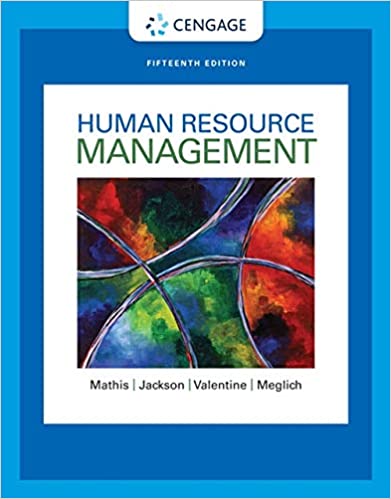
Human Resource Management 15th Edition by Robert Mathis,John Jackson,Sean Valentine ,Patricia Meglich
Edition 15ISBN: 978-1305500709
Human Resource Management 15th Edition by Robert Mathis,John Jackson,Sean Valentine ,Patricia Meglich
Edition 15ISBN: 978-1305500709 Exercise 1
Mentorships Require Dynamic Goal Setting
What makes goal setting such a perplexing process for mentors and mentees? First of all, goals must be SMART, meaning that they must be specific, measureable, action-based, realistic, and time-bound. If this isn't difficult enough, trying to figure out the roles that mentors and mentees should play in goal setting can be challenging as well. Mentors should help the process along, but mentees should be the ones who manage goal setting, particularly because the goals affect their job efforts. The overall objective in sound goal setting is to develop a learning partnership between both parties so that mentees can better set and work toward their professional objectives.
How can mentors help mentees take more responsibility for their goal setting? As a mentor, there are several things you can do to achieve these results:
• Be a good listener. Try to understand the mentee's current work situation to determine the contextual factors that may affect the goal-setting process. Also, try to determine an individual's strengths, weaknesses, opportunities, and threats (kind of like a personal SWOT analysis) so that goals can be developed based on the proper match between the work environment and the mentee's situation analysis.
• Provide good examples. Talk about your own positive work experiences to give mentees a model for success. You can also discuss other examples of successful people who were driven by positive goals.
• Match all the important pieces together. Be careful to help mentees connect their goals with the objectives of the organization. Also make sure that the goals established help mentees work effectively given their own work situations.
• Brainstorm over different viewpoints. Encourage mentees to view their characteristics and work situations in different ways to make sure that reasonable goals have been set.
• Emphasize the importance of time. Discuss which goals should be given priority and determine how well goals can be accomplished given the time lines established.
Evidence suggests that adopting these approaches will help build positive mentor- mentee relationships. At a minimum, this process can help encourage more communication among mentors and mentees, which is always productive when it comes to goal setting.
As an HR professional or line manager, you will likely have to consider how to enhance mentorship arrangements. Consequently, consider the following questions:
How can mentorships be used to improve job performance?
What makes goal setting such a perplexing process for mentors and mentees? First of all, goals must be SMART, meaning that they must be specific, measureable, action-based, realistic, and time-bound. If this isn't difficult enough, trying to figure out the roles that mentors and mentees should play in goal setting can be challenging as well. Mentors should help the process along, but mentees should be the ones who manage goal setting, particularly because the goals affect their job efforts. The overall objective in sound goal setting is to develop a learning partnership between both parties so that mentees can better set and work toward their professional objectives.
How can mentors help mentees take more responsibility for their goal setting? As a mentor, there are several things you can do to achieve these results:
• Be a good listener. Try to understand the mentee's current work situation to determine the contextual factors that may affect the goal-setting process. Also, try to determine an individual's strengths, weaknesses, opportunities, and threats (kind of like a personal SWOT analysis) so that goals can be developed based on the proper match between the work environment and the mentee's situation analysis.
• Provide good examples. Talk about your own positive work experiences to give mentees a model for success. You can also discuss other examples of successful people who were driven by positive goals.
• Match all the important pieces together. Be careful to help mentees connect their goals with the objectives of the organization. Also make sure that the goals established help mentees work effectively given their own work situations.
• Brainstorm over different viewpoints. Encourage mentees to view their characteristics and work situations in different ways to make sure that reasonable goals have been set.
• Emphasize the importance of time. Discuss which goals should be given priority and determine how well goals can be accomplished given the time lines established.
Evidence suggests that adopting these approaches will help build positive mentor- mentee relationships. At a minimum, this process can help encourage more communication among mentors and mentees, which is always productive when it comes to goal setting.
As an HR professional or line manager, you will likely have to consider how to enhance mentorship arrangements. Consequently, consider the following questions:
How can mentorships be used to improve job performance?
Explanation
Mentorship roles lie in setting of goals...
Human Resource Management 15th Edition by Robert Mathis,John Jackson,Sean Valentine ,Patricia Meglich
Why don’t you like this exercise?
Other Minimum 8 character and maximum 255 character
Character 255


